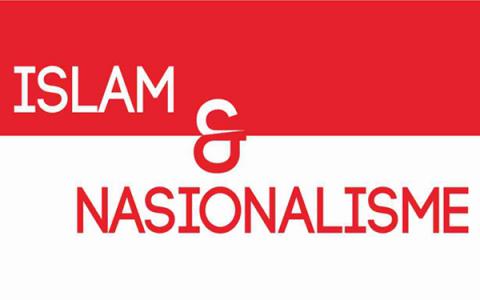By A Muchlishon Rochmat
I think Indonesia is one of few countries that be success managing relation between religion and state, and formulating Islam, nationalism, and democracy. If we look at the Islamic countries in the middle east, they are still in chaos until now. They could not frame religion and nationalism in administering the state. So that way, every single element of the people –even the government- in those countries are conflict among another.
In his book Islam dan Tata-Negara, Munawir Sjadzali states that there are three kinds of relation between Islam and state system. First, Islam is the perfect religion that take care of all life aspects in this world, including how to manage the state (integralistic). People who stand this paradigm believe that Islam is religion and also the state (Al islamu huwa ad din wa daulah). They argue practices of islamic politics that should be implemented is the system which was performed by Prophet Muhammad and Khulafaur Rasyidin (four of Muhammad’s successors). Sayyid Quthb, Syekh Muhammad Sayyid Ridlo, Al Maududi, and etc are the supporters of this paradigm.
Second, Islam does not have any relation in the state (secularistic). This paradigm views that Muhammad is only a messenger who teaches moral and guides his adherents in worshiping God. Muhammad was sent to be messenger only, not to be president of Islamic country. The supporters of this paradigm are Thaha Husein and Ali Abd al Raziq.
Most of Western countries implement this paradigm. They strictly separate between religion and state. France is known as the most strict country which adjust this paradigm. The country of Napoleon Bonaparte has laicete concept in managing state government. A concept that forbid religious symbols -such as veil, hijab, turban, burkini, kippa, criss-cross, Buddha statue, and etc- are shown in the public sphere, especially in the government offices.
The last, there is no certain concept of state in Islam, but Islam only gives the signs in managing the state such as discussion (syuro), fair (‘adl), and make people’s prosperity as the priority. One of the supporters of this view is Muhammad Husein Haikal. If the first one stresses implementing islamic teaching and law formally, so the third one is in the contrary, the most important one is how islamic values substantially could be undertaken and practiced. Nevertheless, there is partial of islamic law which is adopted to be positive law such as marriage, waqf, and so on. Principally, this paradigm Islam and state has mutual relation. Both strengthen and complete each other.
Among the three paradigms above, Indonesia’s concept of the state is the third one. In the history in arranging national principle, our founding parents debated tremendously. The Islamist front suggested to make Indonesia as the islamic country, syariah Islam as the national principle. In the other hand, the nationalist front proposed Indonesia become democratic country. After contenting the argument, they were agree to make Indonesia as the religious state with Pancasila (five pillars) as the national principle. It is because they believe that Pancasila is the manifestation of islamic values.
Nationalism in The Biggest Islamic Country
The chairman of Nahdlatul Ulama Executive Board (PBNU) KH Said Aqil Siroj always says that the chaos in the islamic countries in the middle east is caused the people of those countries do not have the concept of nationalism toward their countries. They also can not find the meeting point (kalimatun sawa’) between Islam and democracy. They always contrast both and judge that democracy is the product of infidel. So that way, democracy is not appropriate with Islam.
Meanwhile, Indonesia -the biggest islamic country- does not contradict between Islam and democracy. Indonesian people have the high nationalism in defending their motherland. They believe that Islam, democracy, and nationalism are compatible among anothers. And I think the starting point of fusing Islam and nationalism in Indonesia is Resolusi Jihad which was triggered by KH Hasyim Asy’ari, the founder of the biggest of islamic organization Nahdlatul Ulama (NU). He argued that love the homeland is part of faith (hubbul wathon minal iman). In other word, he said that defending homeland from colonization is obligation (fardhu ‘ain) for every Muslim. So, if some one dies in defending the homeland, they would be counted as the martyrs.
I believe that ‘the spell’ of hubbul wathon minal iman has been ingrained in the vein of Indonesian people. They will save and guard the wholeness and unity of Indonesia from anything threatening Indonesia. Their nationalism is no doubt anymore. Because religion (Islam) would be strong if the state -where the religion stands- is also stable.
The writer is The Vice of General Secretary of Indonesian Islamic Youth Council (MPII Pusat)
Terkait
Terpopuler
1
Khutbah Jumat: Ramadhan dan Kesempatan yang Tidak Selalu Terulang
2
Innalillah, Ulama Mazhab Syafii asal Suriah Syekh Hasan Hitou Wafat dalam Usia 83 Tahun
3
Kultum Ramadhan: Lebih Baik Sedikit tapi Istiqamah
4
Khutbah Jumat: Ramadhan, Melatih Sabar, Memperkuat Syukur
5
Keluar Mani yang Tidak dan Membatalkan Puasa
6
Khutbah Jumat: Tiga Kebahagiaan Orang Puasa
Terkini
Lihat Semua



